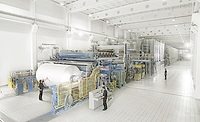BASF has announced it is taking measures to avoid the creation of overcapacities as a result of a massive decline in demand. The company is temporarily shutting down around 80 plants worldwide. In addition, BASF is reducing production at approximately 100 plants.
“We already drew attention to the difficult economic situation at the end of October. Since then, customer demand in key markets has declined significantly,” said Dr. Jürgen Hambrecht, chairman of the Board of Executive Directors of BASF SE. “In particular, customers in the automotive industry have canceled orders on short notice.”
In addition, sales volumes are being negatively impacted by increased reduction of inventory by customers and a lack of credit in customer industries.
“In 2008, BASF will therefore not achieve the previous year’s excellent EBIT before special items,” said Hambrecht. “How the coming year will develop is difficult to foresee. BASF is preparing for tough times.”
Worldwide, approximately 20,000 employees will be affected by the production cuts. Flexible working time arrangements will be used wherever possible.
At the company’s main site in Ludwigshafen, Germany, BASF SE has signed an agreement with the works council under which the measures will be implemented through the flexible use of working time arrangements such as overtime and vacation. According to current plans, the measures are expected to affect approximately 5,000 employees in Ludwigshafen.
“We are responding flexibly to market developments and are acting quickly,” explained Hambrecht. “BASF will now focus even more closely on cost and budget discipline, and will use opportunities arising from the crisis. We will also proceed swiftly with the planned acquisition and integration of Ciba to further optimize our business.”
The adjustments are primarily being carried out in units that supply the automotive, construction and textile industries. Value chains affected include ammonia, styrene and polyamide, which manufacture precursors for engineering plastics, coatings, and fibers. The shutdowns will be coordinated throughout BASF’s global production Verbund and will involve all six Verbund sites in Europe, Asia, and North America, as well as other sites. Implementation of most of the measures has already started; reduced capacities are expected to last until January 2009 for individual plants. Should the period of weak demand continue, and if all other flexible working time models have been exhausted, the company cannot rule out the need for short-time working at individual sites worldwide.
For more information, visitwww.basf.com.
BASF REDUCES PRODUCTION WORLDWIDE
Looking for a reprint of this article?
From high-res PDFs to custom plaques, order your copy today!





